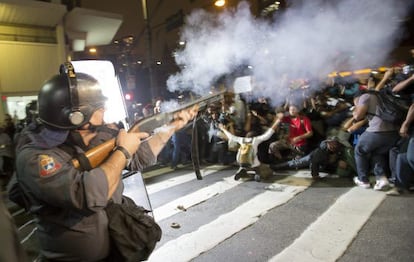Brazilian police killed more people in five years than US officers did in 30
Report warns of security force brutality and prison overcrowding

Brazilian police forces have killed 11,197 people in the last five years – more than their American counterparts have in the last 30.
In the United States 11,090 victims have died at the hands of law enforcement officers over the last three decades.
In Brazil a murder was committed every 10 minutes last year and there were 53,646 violence-related deaths. Police officers were responsible for 2,212 of those fatalities, an average of six a day.
According to experts, that number has stabilized and the homicide rate, which stands at 26.6 per 100,000 residents, is much lower than in countries such as Honduras (90.4 per 100,000) and Venezuela (53.7). Yet it is still very high, they say. “This data is a cause for concern in a democracy, especially one that faces other problems such as poverty, inequality, challenges in education, while we cannot get consistent results in public security,” says Oscar Vilhena, the director of the law school at Fundación Getúlio Vargas.
In Brazil last year a murder was committed every 10 minutes and there were 53,646 violence-related deaths
The statistics on police violence are one of the issues that worry the experts who have been in charge of preparing the country’s annual report on public security for the last eight years. “Police forces keep up a pattern that abuses the deadly use of force as a response to crime and violence,” says Samira Bueno, director of NGO Fórum de Segurança Pública and the person in charge of the study. The report – almost the only research available on statistics related to violence in Brazil – condemns the vulnerability of security officers, the high number of homicides, overcrowded prisons and a system it considers racist. Sixty-one percent of prisoners and 68 percent of murder victims are black.
The records on Brazilian prisons, which house 574,207 inmates, are no cause for celebration. The report describes an overcrowded system in need of 220,000 additional spaces to deal with the large numbers convicted of drug-related crimes – a number that has increased by 10 percent in the last few years. What’s more, according to the study, 40 percent of prisoners are still awaiting trial.
“The prison population has increased every year and the budget is not enough,” says Fórum de Segurança Pública Vice President Renato Sergio de Lima. “Although the perception is that there is little accountability, there is punishment. But it is a preventive punishment and for crimes for which jail is a questionable response, like the sale of small amounts of drugs.” He also emphasizes the fact that criminal groups dominate life within the prisons. “The system ends up reinforcing criminal ties,” he says.
The study comes with a survey – prepared by Fundación Getúlio Vargas – on Brazilians’ confidence in their country’s institutions and laws. According to the research, only 32 percent have faith in the justice system and only 33 percent of those interviewed said they trusted the police. “These are very negative numbers because the justice system is usually in a better place than the police in other countries but, in general, people in Brazil do not have faith in law enforcement,” Vilhena says. “There are signs that explain this data. The justice system is slow and it does not apply the law equally. With respect to the police, people think it’s pointless to go to them because they won’t open an investigation, and on the other hand, people fear their arbitrariness, violence and corruption.”
Eighty-one percent of those surveyed said it was easy to break the law in Brazil.
Translation: Dyane Jean François
Tu suscripción se está usando en otro dispositivo
¿Quieres añadir otro usuario a tu suscripción?
Si continúas leyendo en este dispositivo, no se podrá leer en el otro.
FlechaTu suscripción se está usando en otro dispositivo y solo puedes acceder a EL PAÍS desde un dispositivo a la vez.
Si quieres compartir tu cuenta, cambia tu suscripción a la modalidad Premium, así podrás añadir otro usuario. Cada uno accederá con su propia cuenta de email, lo que os permitirá personalizar vuestra experiencia en EL PAÍS.
¿Tienes una suscripción de empresa? Accede aquí para contratar más cuentas.
En el caso de no saber quién está usando tu cuenta, te recomendamos cambiar tu contraseña aquí.
Si decides continuar compartiendo tu cuenta, este mensaje se mostrará en tu dispositivo y en el de la otra persona que está usando tu cuenta de forma indefinida, afectando a tu experiencia de lectura. Puedes consultar aquí los términos y condiciones de la suscripción digital.









































